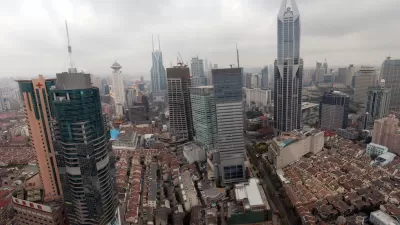Marina Hyde writes that the "horrible thing about China's 62-mile nine-day jam was that it destroyed the certainty that travel will inevitably result in arrival."
Among the citizens of the Chinese traffic jam, there appears to be little camaraderie; a reflection of our notion that traffic is always something inflicted upon us, even though it is manifestly a collective activity. "We say we are "in" traffic, dramatizing ourselves as a lone vehicle of noble and rational intent, with a sea of malevolent, dead weight antagonists stretching endlessly fore and aft," Hyde explains.
It is clear that we have a number of psychological duplicities to confront with regards to vehicular congestion. Indeed, the word traffic means movement of some sort but has been commandeered to imply sitting still.
"What we've always comforted ourselves with, however, is the idea that we'll get out of this jam eventually. The grimly hilarious thing about the Chinese gridlock is that it has appeared at times to be undermining this last psychological defence against the fear that we are all eternally trapped on a journey going nowhere. "Who knows when it will end?" one driver was quoted as asking. Another, more to the point, wondered: "Who knows if it will ever end?""
FULL STORY: Are we there yet? Soon we'll all be on a road to nowhere

Maui's Vacation Rental Debate Turns Ugly
Verbal attacks, misinformation campaigns and fistfights plague a high-stakes debate to convert thousands of vacation rentals into long-term housing.

Planetizen Federal Action Tracker
A weekly monitor of how Trump’s orders and actions are impacting planners and planning in America.

In Urban Planning, AI Prompting Could be the New Design Thinking
Creativity has long been key to great urban design. What if we see AI as our new creative partner?

King County Supportive Housing Program Offers Hope for Unhoused Residents
The county is taking a ‘Housing First’ approach that prioritizes getting people into housing, then offering wraparound supportive services.

Researchers Use AI to Get Clearer Picture of US Housing
Analysts are using artificial intelligence to supercharge their research by allowing them to comb through data faster. Though these AI tools can be error prone, they save time and housing researchers are optimistic about the future.

Making Shared Micromobility More Inclusive
Cities and shared mobility system operators can do more to include people with disabilities in planning and operations, per a new report.
Urban Design for Planners 1: Software Tools
This six-course series explores essential urban design concepts using open source software and equips planners with the tools they need to participate fully in the urban design process.
Planning for Universal Design
Learn the tools for implementing Universal Design in planning regulations.
planning NEXT
Appalachian Highlands Housing Partners
Mpact (founded as Rail~Volution)
City of Camden Redevelopment Agency
City of Astoria
City of Portland
City of Laramie





























